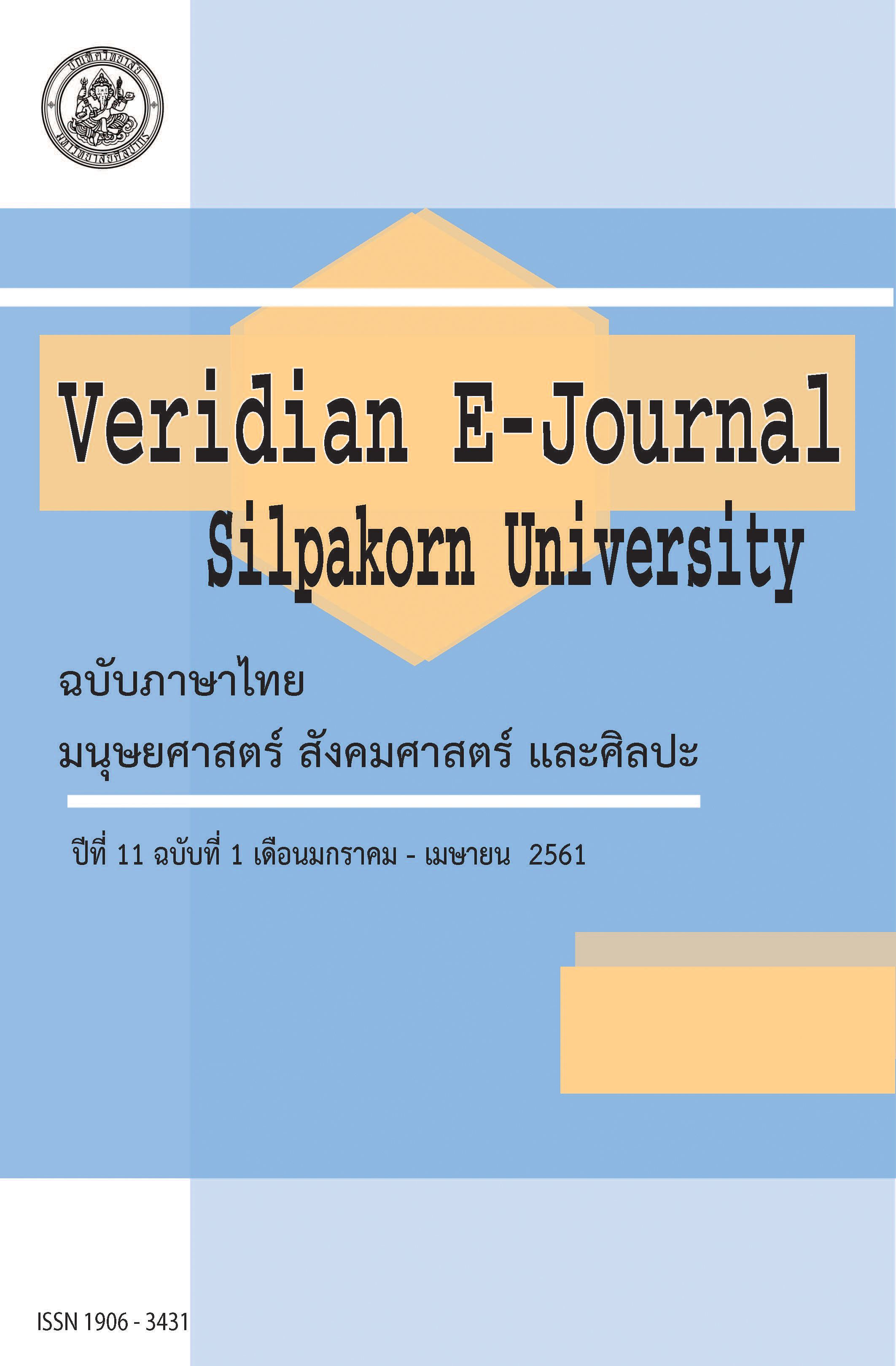อิทธิพลของการสนับสนุนจากองค์การ การให้อำนาจเบ็ดเสร็จเชิงจิตวิทยา และความยุติธรรมในองค์การต่อความยึดมั่นผูกพันในงาน ความพึงพอใจในงาน และผลการปฏิบัติงานของบุคลากรมหาวิทยาลัยราชภัฏกลุ่มรัตนโกสินทร์(The influence of organizational support, psychological empo- The influence of organizational support, psychological empowerment, and organizational justice on work engagement, job satisfaction and employee job performance of Rajabhat Universities in Ratanagosin Group
Main Article Content
Abstract
งานวิจัยนี้มีวัตถุประสงค์ คือ (1) เพื่อศึกษาปัจจัยที่มีอิทธิพลต่อความยึดมั่นผูกพันในงานของบุคลากร ได้แก่ การสนับสนุนจากองค์การ การให้อำนาจเบ็ดเสร็จเชิงจิตวิทยา และความยุติธรรมในองค์การของบุคคลากรมหาวิทยาลัยราชภัฏกลุ่มรัตนโกสินทร์ (2) เพื่อศึกษาปัจจัยที่มีอิทธิพลต่อความพึงพอใจในงานของบุคลากร ได้แก่ การสนับสนุนจากองค์การ การให้อำนาจเบ็ดเสร็จเชิงจิตวิทยา ความยุติธรรมในองค์การ และความยึดมั่นผูกพันในงานของบุคคลากรมหาวิทยาลัยกลุ่มรัตนโกสินทร์ (3) เพื่อศึกษาปัจจัยที่มีอิทธิพลต่อผลการปฏิบัติงานของบุคลากร ได้แก่ ความยึดมั่นผูกพันในงาน และความพึงพอใจในงานของบุคคลากรมหาวิทยาลัยกลุ่มรัตนโกสินทร์ (4) เพื่อตรวจสอบความสอดคล้องของโมเดลความสัมพันธ์เชิงสาเหตุที่พัฒนาขึ้นกับข้อมูลเชิงประจักษ์ ผู้วิจัยดำเนินการวิจัยเชิงปริมาณ โดยทำวิจัยเชิงประจักษ์ ใช้แบบสอบถามเป็นเครื่องมือในการเก็บรวบรวมข้อมูลจากบุคลากรมหาวิทยาลัยราชภัฎกลุ่มรัตนโกสินทร์ ขนาดตัวอย่างจำนวน 523 คน ใช้การเลือกตัวอย่างแบบโควต้า สถิติที่ใช้ในการวิเคราะห์ข้อมูล ได้แก่ การแจกแจงความถี่ การหาค่าร้อยละ การหาค่าเฉลี่ย การหาค่าส่วนเบี่ยงเบนมาตรฐาน และการวิเคราะห์โมเดลสมการโครงสร้าง
ผลการวิเคราะห์โมเดลสมการโครงสร้างพบว่า โมเดลสอดคล้องกับข้อมูลเชิงประจักษ์อยู่ในเกณฑ์ดี ค่าสถิติไค-สแควร์ (c2) มีค่าเท่ากับ 190.651 องศาอิสระ (df) มีค่าเท่ากับ 189 ค่าไค–สแควร์สัมพัทธ์ (c2/df) มีค่าเท่ากับ 0.972 ค่า p–value มีค่าเท่ากับ 0.453 ค่าดัชนีวัดระดับความกลมกลืน (GFI) มีค่าเท่ากับ 0.972 ค่าดัชนีวัดระดับความกลมกลืนที่ปรับแก้ (AGFI) มีค่าเท่ากับ 0.951 และค่าดัชนีค่าความคลาดเคลื่อนในการประมาณค่าพารามิเตอร์ (RMSEA) มีค่าเท่ากับ 0.004 นอกจากนี้ผลการวิจัยยังพบว่า (1) การสนับสนุนจากองค์การมีอิทธิพลทางตรงเชิงบวกต่อความยึดมั่นผูกพันในงาน (2) การให้อำนาจเบ็ดเสร็จเชิงจิตวิทยามีอิทธิพลทางตรงเชิงบวกต่อความยึดมั่นผูกพันในงาน (3) ความยุติธรรมในองค์การมีอิทธิพลทางตรงเชิงบวกต่อความยึดมั่นผูกพันในงาน (4) การสนับสนุนจากองค์การมีอิทธิพลทางตรงเชิงบวกต่อความพึงพอใจในงาน (5) การให้อำนาจเบ็ดเสร็จเชิงจิตวิทยามีอิทธิพลทางตรงเชิงบวกต่อความพึงพอใจในงาน (6) ความยุติธรรมในองค์การมีอิทธิพลทางตรงเชิงบวกต่อความพึงพอใจในงาน (7) ความยึดมั่นผูกพันในงานมีอิทธิพลทางตรงเชิงบวกต่อความพึงพอใจในงาน (8) ความยึดมั่นผูกพันในงานมีอิทธิพลทางตรงเชิงบวกต่อผลการปฏิบัติงาน (9) ความพึงพอใจในงานมีอิทธิพลทางตรงเชิงบวกต่อผลการปฏิบัติงาน
In this thesis, the researchers examine (1) organization support, psychological empowerment and organization justice as factors influencing work engagement of Rajabhat Universities in Ratanagosin Group. The researchers also investigate; (2) organization support, psychological empowerment, organization justice and work engagement as factors influencing job satisfaction of Rajabhat Universities in Ratanagosin Group. Moreover, the researchers study; (3) work engagement and job satisfaction as factors influencing job performance of Rajabhat Universities in Ratanagosin Group. Finally, furthermore, the researchers determine; and (4) to validate a causal relationship model of the influence of organization support, psychological empowerment and organization justice on work engagement, job satisfaction and employee job performance of Rajabhat Universities in Ratanagosin Group with empirical data. In this research inquiry, the researchers conducted a quantitative empirical research investigation. A questionnaire was used as a research instrument for collecting data from 523 employees representing of Rajabhat Universities in Ratanagosin Group. Utilizing the quota sampling method, the researchers selected the aforementioned members of the sample population. Using techniques of descriptive statistics, the researchers analyzed the data collected in terms of frequency distribution, percentage, mean, and standard deviation. Furthermore, the researchers also employed structural equation modeling (SEM) analysis.
It was found that the model was consistent with the empirical data.The chi-square (c2) was 190.651; degrees of freedom (df) = 189, c2/df = 0.972, probability-value (p-value) = 0.453; goodness of fit index (GFI) = 0.972, adjusted goodness of fit index (AGFI) = 0.951; and root mean square error of approximation (RMSEA) = 0.004. It was also found that: (1) organization support had positive and direct influence on work engagement; (2) psychological empowerment had positive and direct influence work engagement; (3) organizational justice had positive and direct influence work engagement; (4) organization support had positive and direct influence job satisfaction; (5) psychological empowerment had positive and direct influence job satisfaction; (6) organizational justice had positive and direct influence job satisfaction; (7) Work engagement had positive and direct influence job satisfaction; (8) Work engagement had positive and direct influence employee job performance; and (9) Job satisfaction had positive and direct influence employee job performance.

